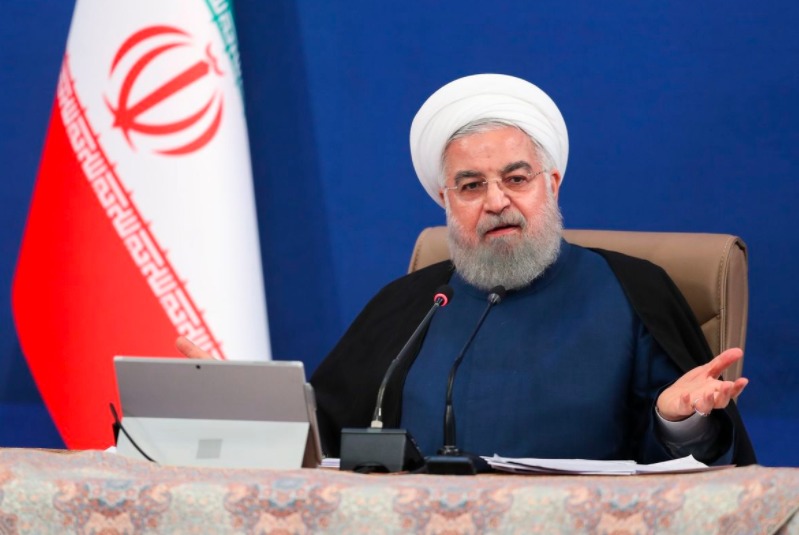Israel-U.A.E. Diplomatic Deal Ratchets Up Tensions With Iran - Amir Handjani

Iran unleashed an angry broadside this weekend reacting to the establishment of formal diplomatic relations between Israel and the United Arab Emirates, a deal signaling deeper cooperation between the Jewish state and Gulf Arabs to counter Tehran as it vies for regional influence.
In a nationally televised speech Saturday, Iran’s president, Hassan Rouhani, said, “We warn the Emirates: Don’t open the region for the Zionist regime to step in.” If the agreement leads to expanded Israeli influence in the region, Mr. Rouhani said, “Things will change, and they will be dealt with in a different way.”
On Sunday, Iran’s top military commander, Maj. Gen. Mohammad Baqeri, said Tehran’s attitude toward the U.A.E. will change fundamentally and that the armed forces “will also deal with that country with different calculations.”
The U.A.E. and Israel had been quietly forging commercial and security links for years before the two nations decided, at the urging of the Trump administration, to conclude a formal diplomatic accord.
The agreement followed a period of de-escalation between the U.A.E. and Iran, and the timing caught Tehran by surprise, according to Diako Hosseini, director of the World Studies Program at the Center for Strategic Studies in Tehran, which is affiliated with the presidential office.
“Trust has been lost to a great extent, and it won’t return quickly,” Mr. Hosseini said. Still, he said he thought the likelihood of imminent military action was low. “I don’t think we will see a radical reaction,” Mr. Hosseini said. “We should wait and see the outcome … whether the region will turn into a counterintelligence and counterespionage battlefield.”
The Emirati foreign ministry summoned the Iranian charge d’affairs Sunday and condemned the threatening rhetoric from Tehran, the ministry said in a statement.
Iran and the U.A.E. have a mutual interest in maintaining relations in some form. As Iran’s economy has suffered greatly under U.S. sanctions, the U.A.E. has provided a vital trade and banking channel for Tehran to keep up some level of foreign trade, which also benefits the Emirates.
During the past year, the U.A.E., which is within reach of Iranian missiles, has sought to reduce tensions that could lead to military confrontation. When explosions blew holes in four tankers near the Emirati port of Fujairah last year, Abu Dhabi didn’t blame Iran, even as Washington and Riyadh did so.
The tanker attacks were part of a series of incidents that have kept Iran and its adversaries at the edge of conflict.
Tensions peaked in January when the U.S. killed a top Iranian general in a drone strike in Iraq. Iran responded to the killing by launching more than a dozen missiles at a base in Iraq housing U.S. troops.
Some analysts predicted Tehran would respond to the Israel-U.A.E. deal by reinforcing links to regional militia groups, from Iraq to Syria to Lebanon and Yemen. Those groups have remained hostile to the U.S. and its Arab allies, and often served as Iran’s first line of defense—and offense.
Ali Fathollah-Nejad, an Iran expert at the Brookings’ Center for Middle East Policy, said the pact “solidifies the view in Tehran that there is an unholy alliance between some of its Arab foes—basically, Arab collaborators—with Israel and the United States.”
For Iran’s clerical-led government, resistance to foreign interference in the region has been an ideological cornerstone. Since the 1979 Islamic Revolution, it has vied with Saudi Arabia for the mantle of leadership among Muslims in the Middle East. The two nations have long portrayed themselves as competing champions of the Palestinian cause.
As part of Thursday’s diplomatic deal with the Emirates, Israel agreed to temporarily suspend a plan to annex parts of the Palestinian-populated West Bank. Prime Minister Benjamin Netanyahu didn’t take it off the table, though.
Iran has never been at outright war with Israel, but it funds a host of militias in Israel’s vicinity, including militant groups in Gaza, such as Hamas, and the Lebanese Hezbollah movement.
In a phone call Friday, Iranian Foreign Minister Javad Zarif reassured the leader of Palestinian Islamic Jihad, Ziyad al-Nakhalah, that the accord would only strengthen popular support for the Palestinian cause, according to the semiofficial Iranian ISNA news agency.
But in Iran itself, the Palestinian cause is of diminishing importance, particularly to the younger generation. Antigovernment protests have featured chants calling for Iran’s leaders to spend money at home instead of on revolutionary causes in Palestine and Lebanon.
Iran keeps a strong foothold in Syria, bordering Israel, after helping President Bashar al-Assad defeat the armed opposition. It has vast influence in Iraq through powerful militias that have fought Islamic State, U.S. forces and gained political power—and it maintains trade ties pivotal to both countries.
Iran has also forged ties with Turkey based on trade and shared enmity with the U.S.
Despite these deepening fault lines, the U.A.E. has so far taken a pragmatic approach by striking a tenuous balance between Tehran and its rivals.
The U.A.E. backed the Trump administration’s decision to withdraw from the 2015 international nuclear deal and impose crippling sanctions on Iran. It has supported forces opposed to the Iran-backed Houthis in the Yemeni war.
At the same time, the U.A.E. remains Iran’s fourth-largest export destination, according to the Tehran Chamber of Commerce, Industries, Mining and Agriculture.
“Iran will still have to deal with the U.A.E.,” said Amir Handjani, a nonresident senior fellow with the Truman National Security Project. “Most countries have relations with Israel, and Iran has relations with most of those countries.”
Articles from Amir Handjani
View blog
Iran’s deadly wave of protests has taken the government and security forces by surprise. · What star ...

The United States has long promised to ensure trade in humanitarian goods for countries under its ec ...

President Donald Trump has made his disdain for the nuclear agreement with Iran quite apparent. It’s ...
You may be interested in these jobs
-
Application Engineer
Found in: beBee S2 US - 1 week ago
WESCO Seattle, United States Paid WorkAs an Application Engineer, you will be responsible for partnering with sales and manufacturers to provide technical expertise regarding applications of products/services. You will answer questions and demonstrate how product offerings and services can solve customer problems and ...
-
Inspector
Found in: beBee S2 US - 2 weeks ago
Department Of State Rosslyn, United States Full timeSummary · This position is located with the U.S. Department of State, Office of the Inspector General (OIG), which has statutory oversight responsibility covering the Department, the U.S. Agency for Global Media (USAGM), and the International Boundary and Water Commission (IBWC). ...
-
Dermatologist
Found in: Getgigs US C2 - 3 weeks ago
Jefferson Healthcare Port Townsend, United States Full timeJefferson HealthcareDermatologistAnnouncement # Jefferson Healthcare ) has an exciting opportunity for a full-time Medical Dermatologist in beautiful Port Townsend, Washington. Join an established group including two Dermatologist/Mohs Surgeons as well as three dedicated Dermatol ...



Comments